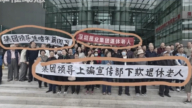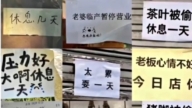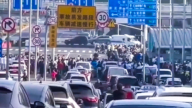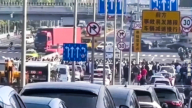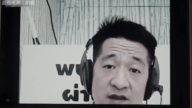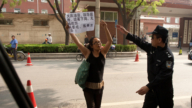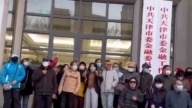【新唐人2013年05月16日讯】5月14号,大陆国务院新闻办发表《2012年中国人权事业的进展》白皮书,白皮书从六个方面介绍中国过去一年推动人权的所谓成绩。但多数律师认为,中国的人权状况并没有明显改善,甚至倒退。
这份白皮书总长约2万多字,从经济、政治、文化、社会、生态文明及外部交流合作等6个方面,介绍了中国人权状况的最新进展。
其中,白皮书以大量经济数据强调人民生活水平不断提高。但是大陆“东南大学”法学教授张赞宁表示,国民生产总值GDP提高,或人民的收入提高,与人权毫无关系。
张赞宁:“如果说给你饭吃、给你衣服穿,不至于饿死、冻死,这就是人权的话,这是很荒谬的。所以,人要讲话、要有政治权利、要有信仰权,这是人区别于动物的最根本的地方。”
中国民主运动的标志性人物魏京生也向《新唐人》表示,中国所谓富裕了,也只是部分人富裕了,还有相当多的中国人非常贫困。
魏京生:“按联合国的贫困标准的话,中国至少还有两三亿人在贫困线以下,包括城市里都有很多的贫民。现在东西那么贵,然后他们一个月只能挣一两千块钱,大多数的劳动人民,包括中产阶级下层,他看不起病,他上不起学,买不起房。甚至你看那有钱人都往外跑呢!你生活水平改善了,所谓有钱了,并不等于就是有了人权。”
北京律师江天勇从几方面评估中国的人权状况。
北京律师江天勇:“你可以看到,很多农民失去土地,很多城市的居民失去自己的房屋,到处都是强拆。人们为了保护自己的房屋不被强拆,各种各样的抵抗,有自焚!也有农民因为保护自己的土地,被构陷判刑、被殴打! ”
另外,江天勇说,还有很多企业下岗的工人,他们下岗之后一无所有,还有,如三峡水库等移民,他们因为生活没有着落,到处上访。而在司法方面,因为司法不公,人们难以通过司法救济的途径来维护自己的权利。
江天勇:“大量民众到北京去上访,但实际上,上访很多被抓入黑监狱,遇到很多截访的,经常看到人被打死的这样的消息,很多信仰者被打压,包括家庭教会、法轮功信仰者,尤其是法轮功信仰者。今年以来,抓了特别多—-东北,包括河北、河南…甚至云南,大面积的抓人。我觉得这就是人权的灾难。”
5月13号,十多位中国人权律师探访四川省“成都资阳法制教育中心”,遭到当局人员殴打和非法拘押。江天勇认为,现在的公权力肆无忌惮,想打压就打压,这是国家在犯罪。
江天勇:“你比如今年二月份、三月份,北京还有广东那边,包括江西,有一些公民要求官员公示财产,他们举牌要求公布,就被抓起来了,这个人被抓了之后,另外有律师去为他们辩护,去会见,当地的不让会见,律师就被公然的殴打,律师的执业权没有保障,公民的任何权利也没有保障。”
人权进展白皮书在“政治建设中的人权保障”一章中,特别提到互联网的平台作用。白皮书声称,“互联网已经成为公民实现知情权、参与权、表达权和监督权的重要渠道,成为政府了解社情民意的重要途径。”
中国网友无忧:“在中国内地上网的人都会经历审查无处不在、无时不在,任何时候都有可能因为涉及敏感的这些东西而被删帖,或者,甚至被追究责任。整体来说,我觉得(人权)还是比较糟糕的。 ”
根据这份人权进展白皮书,截至去年底,中国网络微博用户规模为3.09亿。网民每天发表的论坛帖文和新闻评论达300多万条,微博客每天发布和转发的信息超过2亿条。
但有网友发帖问:怎么没有公布每天的删贴和销号的数据?
采访/易如 编辑/周平 后制/黎安安
China’s Lawyers Refute Official White Paper
On 2012 Human Rights
On May 14th China’s State Council Information Office released
a white paper,"Progress in China’s Human Rights 2012″.
On six areas, the report related the official “achievements"
made in 2012 on China’s human rights situation.
However, many lawyers hold a contrary view. They think
China’s human rights situation has deteriorated.
The 20,000 plus worded white paper stated
the latest “progress"of China’s human rights.
It covered six aspects: economy, politics, culture,
society, ecological civilization and external exchanges.
The report highlighted China’s increase in living standards.
Zhang Zanning, professor of Law at Southeast University says
that growth in GDP or income is unrelated to human rights.
Zhang Zanning:"It’s ridiculous to define human rights as
offering food and clothing to prevent one’s death.
As a human being, a person has right to free speech,
political rights, and has right to choose his own faith.
This is the most essential difference
between human beings and animals."
Wei Jingsheng, iconic figure of China’s democracy movement,
says that only a part of Chinese people have become rich.
A considerable number of people are still living in poverty.
Wei Jingsheng: “Based on the UN poverty standard, China
still has at least 200-300 million people below the poverty line.
There are lots of poor people living in cities.
Now commodities in China are generally expensive.
They only make 1,000-2,000 yuan per month.
Most of salary people cannot afford to see doctors,
to go to school or buy homes.
Just look those rich Chinese, they have all emigrated abroad!
A better-off life or getting rich doesn’t equate to
having human rights."
Beijing lawyer Jiang Tianyong gives his assessment
on China’s human rights situation.
Jiang Tianyong:"In reality, numerous farmers have lost
their lands, and lots of urban residents have lost their houses.
Everywhere you can see forced demolitions.
People have resisted home demolitions in various ways,
including self-immolation!
Many farmers have been sentenced or beaten
just for protecting their own lands."
Jiang Tianyong adds that most laid-off workers
has nothing to live on.
The same situation is also facing immigrants, who moved
away for construction of the Three Gorges Dam project.
They lost their sources of stable income, and
have petitioned for years.
Also, unfair judiciary in China has made it hard for citizens to
seek judicial relief to protect themselves, says lawyer Jiang.
Jiang Tianyong:"Large numbers of people have
petitioned to central authorities in Beijing.
But as a result, lots of them have been detained in black jails.
The authorities have sent staff to locate and intercept
petitioners, and have beaten many to death.
Numerous people have been suppressed
for insisting on their faith.
They include Christian Family Church members and
especially, Falun Gong practitioners.
This year, the authorities have staged
massive nationwide arrests.
In the northeast, in Hebei, Henan, and even in Yunan.
I think these prove human rights disasters in China."
On May 13th a dozen or mpre Chinese human rights lawyers
visited detainees at Ziyang Legal Education Center.
This is a notorious official black jail located in Chengdu,
Sichuan province.
These lawyers were physically assaulted and
illegally detained by the guards.
Jiang Tianyong says that today in China, public power
has been rampantly abused to crack down on citizens.
He points out that this is a state crime.
Jiang Tianyong: “For example, in February and March,
some citizens in Beijing, Guangdong and Jiangxi
called for asset declaration by public officials.
They were arrested for holding placards in public.
After they were arrested, their lawyers were stopped
when going visit them and even beaten.
In China, there’s no security for lawyers to practice law,
and no protection exist for citizens’ civil rights."
The White Paper particularly mentioned
the role of the internet in China.
It alleged that"The internet has become an important
channel for citizens to exercise their right to know,
to participate, to express and to watchdog."
“The internet has also greatly served the government
to know about society and public opinion."
(Netizen, China) Wu You:"China’s netizens have all
experienced official censorship.
Any time your post may be removed for
probably involving any sensitive terms.
You may then be placed under criminal investigation.
Overall, I think human rights here is rather bad."
The report claimed that by the end of 2012, China’s weibo
(micro-blog) users have reached 309 million.
There were over 3 million online posts and commentaries daily.
Each day, more than 200 million weibo posts
were created and forwarded in China.
A netizen asked,"Why haven’t the authorities released data
on daily removal of online posts and netizens’accounts?"


